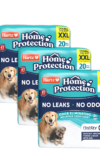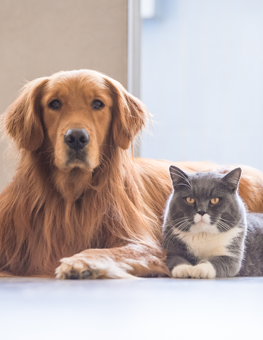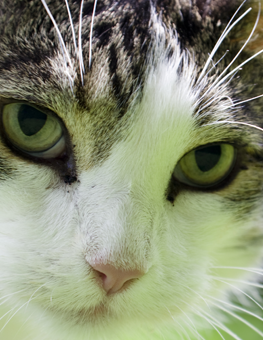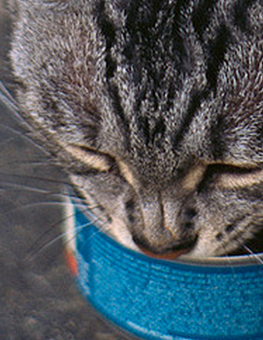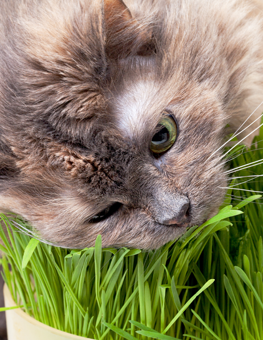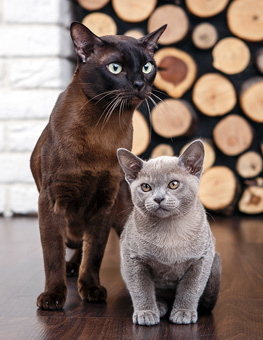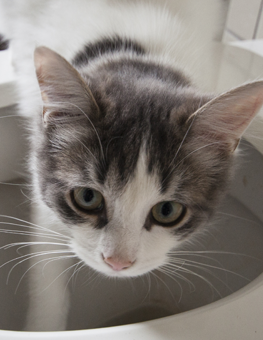Why Does My Cat Have Diarrhea?
Cleaning your cat’s litter box is no one’s idea of fun. But what happens when you stop by for a routine scoop and something is amiss?
This article is not meant to serve as medical veterinary advice.

There are common causes of diarrhea in cats, from intestinal worms to a change in diet.
Diarrhea is smelly, messy, and can be the sign of a
serious problem in your cat. If you’re the owner of a cat with diarrhea, you probably have lots of questions.
What Can Cause Diarrhea in Cats?
Unfortunately, this isn’t an easy answer. There are lots of reasons that cats can have diarrhea. Diarrhea in cats can also be acute, meaning it pops up suddenly and lasts for a short time (24hrs) , or chronic, meaning your cat suffers with diarrhea consistently on a long-term basis. If your cat is experiencing chronic diarrhea and you have not already done so, please contact your veterinarian right away.
Here are a few of the most common causes of diarrhea in cats:
- Intestinal worms, like roundworms, hookworms, and tapeworms
- Change in diet
- Food allergy or intolerance
- Infection (viral, bacterial, fungal, etc.)
- Poison or toxin
- Other diseases, such as diabetes, irritable bowel, or hyperthyroidism1
When Should I Be Concerned About My Cat’s Diarrhea?
All of us deal with an upset tummy every now and then. Taking a look at the color of the cat’s diarrhea can provide some insight as to how serious the problem may be.
- Bloody diarrhea (either bright red or black) can indicate bleeding in the intestinal tract
- Mucus-coated diarrhea can indicate infection or dehydration
- Green diarrhea can be the result of eating grass, or possibly gallbladder disease
- Yellow diarrhea may be a sign of liver failure or zinc poisoning

If you notice something amiss during routine scooping and your cat has chronic diarrhea, contact your vet.
Diarrhea in cats can range from harmless (if the cat just had too many treats), to very serious. Ultimately, a good rule of thumb is to contact your veterinarian if the diarrhea persists for longer than 24 hours.
If the condition persists longer than 24 hours, it’s important to have a vet check your pet no matter what, as you would rather be safe than sorry when it comes to your cat’s health. If your cat is showing other signs of illness alongside the diarrhea, such as loss of appetite, vomiting, lethargy, or weakness, contact your vet immediately.2
What Should I Do if My Cat Has Diarrhea?
After you have checked in with your veterinarian, it’s a good idea to collect a stool sample so that your vet can run a fecal test. You don’t need to collect a lot, but this can be a vital part of diagnosing the problem.
Take a mental note of how long the diarrhea has been going on, if you’ve noticed any other signs of a problem, how frequently you are noticing loose stool, what the diarrhea actually looks like, and if there have been any recent changes to your cat’s diet or environment.
You’ll also want to definitively know which cat is the one with diarrhea, if you have multiple cats. If you don’t know, consider setting up a camera near your cat’s litter box.
How is Diarrhea Treated in Cats?
The treatment for diarrhea largely depends on the cause. Unfortunately, home remedies are not advisable for the treatment of cats with diarrhea, since the cause can only be determined through diagnostics done by your vet. Your veterinarian may want to do bloodwork, take x-rays, or even do an abdominal ultrasound.
Your cat could be prescribed a special veterinary diet. Your vet may also recommend probiotics, deworming, or prescription anti-diarrheal medication. Never use any medication intended for humans or dogs on your cat.
If the diarrhea persists after treatment, be sure to follow up with your veterinarian so that they can modify the treatment plan.
What is the Best way to Clean Up Cat Diarrhea?

For chronic sufferers, use cat diapers to keep your home clean long-term, and change them regularly.
Having an upset or painful stomach can be enough to cause even the best litter box users to pick a new place to poop. If your cat is having diarrhea outside of his litter box, try not to get mad or upset. It’s his only way to let you know that he isn’t feeling well.
Investing in a good enzymatic cleaning product can really help to get the smell and stains out of your flooring. Be sure to use cleaning products that are designed for cleaning up pet messes. All-purpose cleaners may not be strong enough to handle cat diarrhea.
If your cat is still using his litter box faithfully, you’ll want to do a full clean of the box after the diarrhea has resolved. Dump out all the litter and scrub the box with mild soap and water. If infection or parasites were the cause of your cat’s diarrhea, you may want to disinfect the box with bleach or another disinfectant. Avoid using anything with a strong scent like citrus or lemon, as those scents can repel cats.
If your cat is suffering from chronic diarrhea, you may also want to arm yourself with a few cat diapers to keep your home clean long-term. Be sure that you are regularly changing the diapers and keeping your cat’s bottom dry and clean. Dog pads are also a good investment. You can place them around your cat’s litter box in case of any accidents on the floor surrounding it.
1 Cat Diarrhea: Causes and Treatment | PetMD
2 Diarrhea in Cats | VCA Animal Hospitals (vcahospitals.com)




